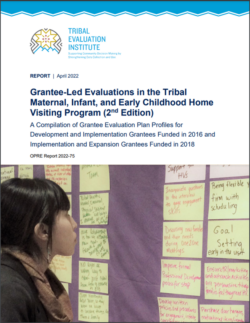Grantee-Led Evaluations in the Tribal Maternal, Infant, and Early Childhood Home Visiting Program (2nd Edition)
- Authors:
- Erica Blue Roberts
- Chi Connie Park
- Caroline Davis
- Amy Painter
- Julie Morales
This report introduces and describes the evaluation studies developed by two cohorts of grantees of the Tribal Maternal, Infant, and Early Childhood Home Visiting Program.
The program provides funding to tribes and tribal/urban Indian organizations for culturally responsive services to American Indian/Alaska Native families and children to strengthen their communities. The grantees use evidence-based home visiting models, with cultural adaptations and enhancements that reflect their unique community needs and contexts.
The profiles in this report outline each grantee’s local program, evaluation plan, and evaluation team. The Development and Implementation grantees (funded in 2016) were required to develop a formative evaluation to support staff in understanding and improving program design and performance. The Implementation and Expansion grantees (funded in 2018) were required to develop a locally relevant program evaluation that used a rigorous mixed-methods design. Details include—
- Home visiting model implemented
- Adaptations, enhancements, or supplements
- Evaluation questions
- Evaluation design and outcomes of interest
- Study type
- Type of data collected and methods used
- Target sample size
- Data collection instruments
- Analysis plan
- Description of evaluation team
- Community engagement efforts
- Grantee contact information
The profiles are designed for evaluators, program implementers, and federal staff who are looking to assess program impact in complex community contexts. They can be used as resources for the development and implementation of future evaluations in tribal communities, as well as to inform evaluation-related policies and grant requirements for tribal funding recipients.


